Related Research Articles
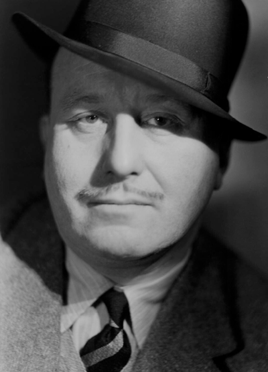
Reginald Evelyn Peter Southouse-Cheyney was a British crime fiction writer who flourished between 1936 and 1951. Cheyney is perhaps best known for his short stories and novels about agent/detective Lemmy Caution, which, starting in 1953, were adapted into a series of French movies, all starring Eddie Constantine. Another popular creation was the private detective Slim Callaghan who also appeared in a series of novels and subsequent film adaptations.
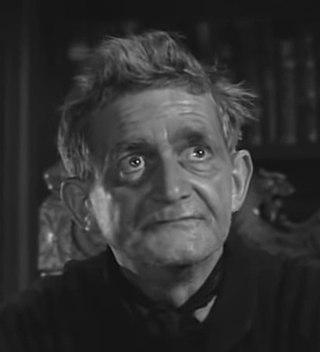
Terence Arthur De Marney was a British film, stage, radio and television actor, as well as theatre director and writer.
Lemmy Caution is a fictional character created by British writer Peter Cheyney (1896–1951). Caution was first portrayed as a Federal Bureau of Investigation (FBI) agent, and in later stories as a private detective.

Derrick Raoul Edouard Alfred De Marney was an English stage and film actor and producer, of French and Irish ancestry.
Nigel Strangeways is a fictional British private detective created by Cecil Day-Lewis, writing under the pen name of Nicholas Blake. He was one of the prominent detectives of the Golden Age of Detective Fiction, appearing in sixteen novels between 1935 and 1966. He also features in a couple of short stories.
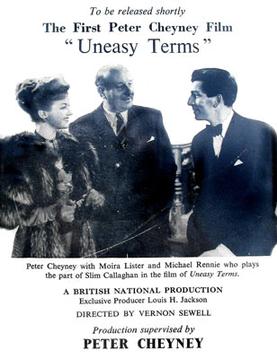
Uneasy Terms is a 1948 British crime thriller film directed by Vernon Sewell and starring Michael Rennie, Moira Lister and Faith Brook. It is based on the 1946 novel of the same name by Peter Cheyney.

Meet Mr. Callaghan is a 1954 British crime drama film directed by Charles Saunders and starring Derrick De Marney and Adrienne Corri. The screenplay was by Brock Williams, based on the 1952 play of the same name, adapted for the stage by Gerald Verner from Peter Cheyney's 1938 novel The Urgent Hangman.
Gerald Verner (1897–1980) was a writer of thrillers, writing more than 120 novels translated into over 35 languages. Many of these were adapted into radio serials, stage plays and films.
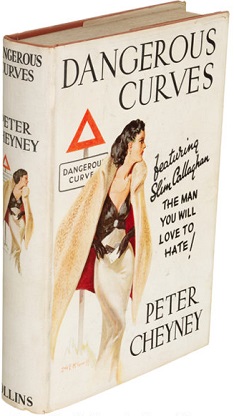
Dangerous Curves is a 1939 thriller novel by the British writer Peter Cheyney. It was the second novel featuring his private detective character Slim Callaghan, following The Urgent Hangman (1938). Callaghan is hired by Mrs. Riverton to find her missing stepson, who she openly admits she despises.

Dangerous Curves is a 1953 thriller play by the British writer Gerald Verner. It is adapted from the 1939 novel of the same title by Peter Cheyney featuring the private detective Slim Callaghan. It followed the success of Verner's 1952 stage play Meet Mr. Callaghan. It premiered at the Garrick Theatre in London's West End, where the previous play had been staged, and ran for 53 performances between 14 April and 11 June 1953. The cast included Terence De Marney as Callaghan, Shaw Taylor, Stephen Dartnell and Paul Whitsun-Jones.

The Urgent Hangman is a 1938 thriller novel by the British writer Peter Cheyney. It introduced the fictional London-based private detective Slim Callaghan, the first in a series of seven novels as well as two short story collections.

Your Deal, My Lovely is a 1941 thriller novel by the British writer Peter Cheyney. It is the seventh in his series of novels featuring the FBI agent Lemmy Caution. Much of the action takes place in wartime London. Caution is called in to investigate the disappearance of a prominent scientist.
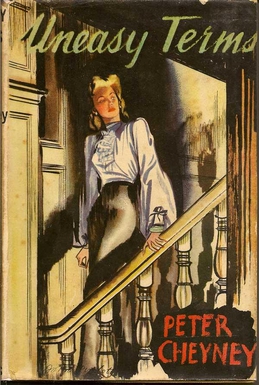
Uneasy Terms is a 1946 crime thriller novel by the British writer Peter Cheyney. It was the seventh and last in his series featuring the London-based private detective Slim Callaghan, a British version of the hardboiled heroes of American writing.

Sorry You've Been Troubled is a 1942 thriller novel by the British writer Peter Cheyney. It was the fifth book in his series featuring the hardboiled London-based private detective Slim Callaghan. It was published in the United States under the alternative title of Farewell to the Admiral.
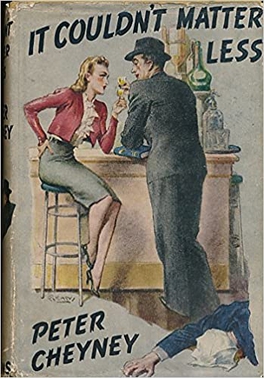
It Couldn't Matter Less is a 1941 thriller novel by the British writer Peter Cheyney. It is the fourth in a series of novels featuring the London-based private detective Slim Callaghan who enjoyed a series of dangerous adventures similar in style to the hardboiled American detectives created by Raymond Chandler and Dashiell Hammett. It was published in the United States as Set-Up for Murder.

Slim Callaghan Intervenes is a 1964 West German crime television series broadcast on ZDF in eight episodes. The programme was based on the series of novels by British writer Peter Cheyney featuring the London-based private detective Slim Callaghan. In the television adaptation Callaghan is operating his own agency in Munich. He is played by Viktor de Kowa while Eva Pflug featured as his loyal secretary Steffie.
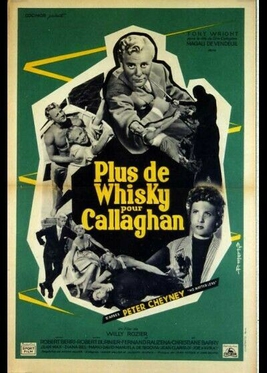
More Whiskey for Callaghan is a 1955 French thriller film directed by Willy Rozier and starring Tony Wright, Magali Vendeuil and Robert Berri. It is an adaptation of the 1941 novel It Couldn't Matter Less by British writer Peter Cheyney featuring the private detective Slim Callaghan. It was the second film featuring English actor Wright as Callaghan following Your Turn, Callaghan.

Your Turn, Callaghan is a 1955 French thriller film directed by Willy Rozier and starring Tony Wright, Lysiane Rey and Colette Ripert. It is an adaptation of the 1942 novel Sorry You've Been Troubled by British writer Peter Cheyney featuring the private detective Slim Callaghan. It was the first in a trilogy of films featuring English actor Wright as Callaghan, followed by More Whiskey for Callaghan.

Sinister Errand is a 1945 spy thriller novel by the British writer Peter Cheyney. Cheyney known for his creations Lemmy Caution and Slim Callaghan, introduced a new character the half-American secret agent Michael Kells. It was followed by a sequel Ladies Won't Wait in 1951.
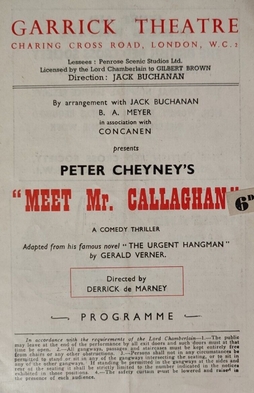
Meet Mr. Callaghan is a 1952 crime thriller play by the British writer Gerald Verner. It was adapted from the novel The Urgent Hangman by Peter Cheyney featuring the private detective Slim Callaghan. It premiered at the Kings Theatre in Southsea before transferring to the Garrick Theatre in London's West End where it ran for 340 performances between 27 May 1952 and 4 April 1953. The cast included Terence De Marney as Callaghan, Larry Burns, Jack Allen, Trevor Reid, John Longden, Lisa Daniels, Harriette Johns and Simone Silva. In 1953 Verner wrote another stage play featuring Callaghan, Dangerous Curves based on Cheyney's novel of the same title.